FOR REFERENCE: This review of, “Dune” is based on a theatrical viewing
Where does one begin with Dune? It’s an extensive doorstop of a 1965 novel that previously served as the basis for a bizarre, heavily modified 1984 movie adaptation by Twin Peaks director, David Lynch, a movie that exists as the kind of uber-80’s fever dream that needs to be seen to be believed. Dune, the novel may have spawned several sequels, but Dune, the 1984 movie was so obviously made for a cult following that there was no way it could be coherently followed up. It was only a matter of time however before Dune was remade, and frankly, I’m amazed that it took Warner Bros. and Legendary Pictures so long to revisit this aged, but beloved sci-fi property, least of all following the rise of WarnerMedia’s own former genre series juggernaut, Game of Thrones.
Dune, the 2021 remake of the 1984 film adaptation of the 1965 novel of the same name, is a movie that’s ripe to pick up where Game of Thrones left off. It’s another franchise starter built around fantastical politics, brutal scheming, and the coveting of ancient, yet potent resources that constantly threaten to tip the delicate balance of power. In keeping with its previous 1984 incarnation as well, Dune is weird. Like, “Who spiked my drink?!” weird. It’s also breathtaking, wonderfully shot and excellently performed. You’ll constantly be in awe of what you’re looking at, even if you won’t always grasp exactly what’s going on.

The dense source material behind Dune does feel like a perfect fit for writer-director, Denis Villeneuve though, coming off of the surprisingly great Blade Runner 2049, another attempt to expand the legacy of a cult favourite 80’s sci-fi movie. Spinning cinematic miracles seems to be something that Villeneuve is quite adept at, and Dune being presented as such a weird, yet unmistakably brilliant blockbuster with that Villeneuve touch instantly cements it as one of the most intriguing movies of 2021, one that effortlessly invites repeat viewings. Perhaps even more strange is that Dune doesn’t even adapt its entire source text as well, instead deliberately dropping the final quarter or so of Frank Herbert’s original novel, something that does admittedly create a bit of a frustrating aftertaste in the moment.
Now that we know Dune is officially getting a sequel in 2023 however, along with a previously-confirmed prequel series that’s in the works for HBO Max, the abrupt stoppage of its dense narrative is a bit easier to swallow. 2021’s Dune may feel frustratingly incomplete for now, but even considering the wait we must currently endure for the rest of the story, this remake still succeeds at drawing you into a magnificent world that challenges the imagination and dazzles the senses, especially if you experience it on the big screen!
Hopefully you’re not afraid of a glossary, assuming you’re not intimately familiar with Frank Herbert’s epic sci-fi universe already, because Dune is absolutely packed with characters, far too many to adequately examine in one review. I wasn’t kidding when I previously compared Dune to Game of Thrones, because this movie packs a Game of Thrones-sized cast into a blockbuster-length presentation! Hell, Game of Thrones’ source novel saga, A Song of Ice and Fire, supposedly took inspiration from the politics and characterization of the Dune novels, so that should give you a fair idea about the kind of robust cast that you’re dealing with in this adaptation. The one notable difference is that Dune is a PG-13 movie, and is thus less violent and more audience-friendly than the borderline NC-17-worthy Game of Thrones.
Inevitably, some of Dune’s carefully cultivated cast ends up underserved in this first offering. To start, Stellan Skarsgard’s arch-villain, Baron Vladimir Harkonnen, along with his nephew, Glossu Rabban, played by Dave Bautista, both of whom being noblemen that oppose the protagonists’ House Atreides, barely show up in this movie, and largely exist to tease a sequel. The same is true of Zendaya’s character, Chani, a Fremen woman (Fremen are the indigenous human tribe of Arakkis, FYI), one that eventually becomes crucially important to the novel’s story, though not until it gets to the latter portion that Villeneuve extracted from this initial adaptation.
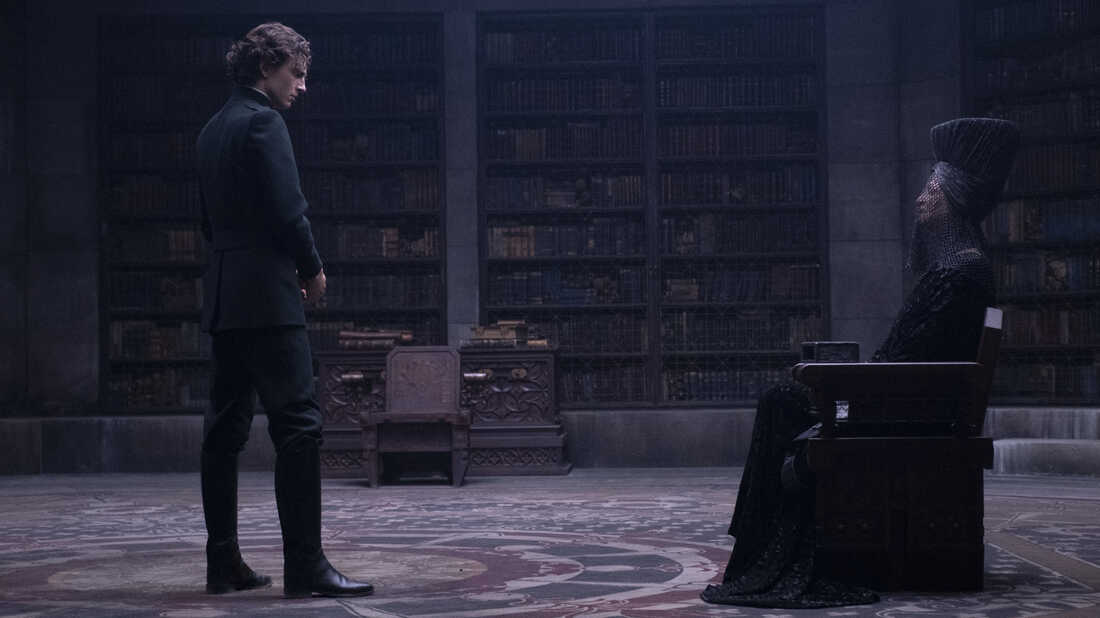
It’s nonetheless impressive that most of Dune’s star-studded cast are utilized as well as they are though, even with a good chunk of the source novel’s story being missing here. House Atreides is where most of the movie’s characterization attention is naturally focused, with that in turn largely surrounding Timothee Chalamet’s central protagonist, Paul Atreides, the young heir to House Atreides’ Spice empire. Paul’s father, Duke Leto Atreides, played by Oscar Isaac, is the frontline presence charged with preparing Paul for his future as steward of Arakkis, after House Atreides becomes responsible for the most valuable resource in the galaxy, a resource that’s plentiful on the planet. All the while however, Paul’s mysterious psychic background creeps into the storyline, with Paul periodically seeing visions of Zendaya’s Chani, while he’s supposedly tested for a great power that mostly resides in the women of his family tree, further rendering Paul a strange anomaly within his new circumstances.
Paul’s journey is also overseen by a variety of protectors, from Jason Momoa’s Duncan Idaho, to Josh Brolin’s Gurney Halleck, to Rebecca Ferguson’s Lady Jessica, all of whom make their own significant impact on Paul’s development as a young nobleman. I can’t go into these characters much without significant spoilers, but rest assured that they all play noteworthy parts in the story, and they’re all performed impeccably by their actors. In fact, even the least utilized cast members get some great moments to shine in Dune, with one of the most memorable being an unrecognizable Javier Bardem as Fremen leader, Stilgar. Not every character arc feels fully fleshed out in this first offering, but Dune is still incredible as a showcase of weighty performances, even as it takes place in a world that feels so proudly unreal.
The complicated storyline of Dune is difficult to sum up for the uninitiated, and tough to explain in detail without spoilers. This is the kind of blockbuster that you’ll either want to approach with a cautious familiarity toward Frank Herbert’s source novel, or no familiarity at all, which is when Dune’s imagination and scope becomes most effective. I suppose the best way to outline the movie’s premise is to simply declare that it’s essentially a sci-fi take on Game of Thrones, detailing noble houses and their affairs surrounding planet stewardship, resource sharing, and power-tipping scheming. Oh, and the main character is a wide-eyed psychic that must eventually follow the surprising source of his galaxy’s favourite drugs, I suppose.
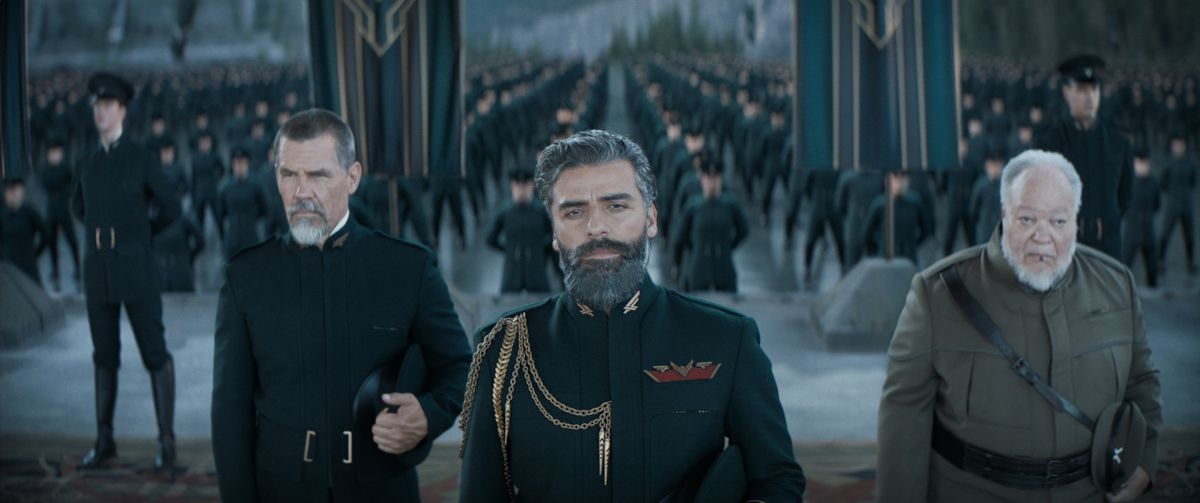
As I’ve mentioned, Dune’s plot is dense, and it doesn’t hold your hand. You’ll likely have to watch the movie a few times to fully grasp everything that happens in it (again, assuming that you’re not already intimately familiar with its source novel), and that’s before considering that the final 30% of the novel’s storyline wasn’t adapted here. That abrupt, unrealized conclusion can make an already confusing storyline even more confusing to some degree.
Still, rather than creating an air of frustration with its dense plotting, Dune instead invites audiences to use their imaginations, and fill in the gaps themselves. Furthermore, while the personalities and politics behind Dune can be quite complex, neither feel like they’re actively trying to exclude viewers that aren’t able to easily wrap their heads around everything that’s going on. Dune instead feels like a big story that was simply too big for just one movie, and thus it had to be split in a fairly awkward way. As much as the movie’s sudden, out-of-nowhere conclusion can be vexing though, this initial odyssey within the new world of Dune feels like a narrative journey worth taking and retaking, like a beautiful, sprawling museum that you won’t have time to fully absorb with just one trip.
Dune is directed and co-written by Canadian writer-director, Denis Villeneuve. Villeneuve has already made quite a splash in the sci-fi movie scene, between two excellent sci-fi blockbusters, Arrival and Blade Runner 2049. Those movies’ particular flavour of grand, weighty sci-fi is a natural fit for Dune, and unsurprisingly, Villeneuve manages to deliver the Dune adaptation that fans and audiences deserve here, not least because this story feels tailor-made to be adapted by him.
Villeneuve’s Dune can be overwhelming at times. It’s intentionally directed to be unpredictable to the senses, deeply steeped in far-future politics that many viewers won’t consistently grasp as they’re debated, and packed to the gills with both subtle and palpable details that are impossible to wholly absorb on the first viewing. Every modicum of Dune’s presentation is polished to a sheen, and not afraid to demand attention from the audience, though also while aspiring to reward that attention with a gradually building sense of investment throughout Dune’s setting. The result is a movie that feels smart without feeling pretentious, and visually engaging without feeling distracting.
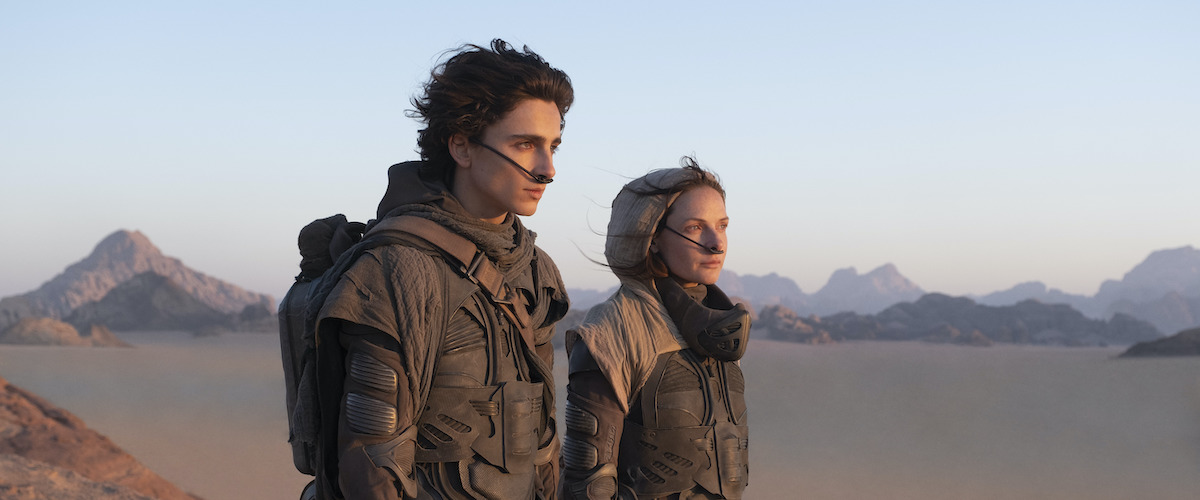
Villeneuve’s decision to only adapt a certain percentage of the original Dune novel is a controversial choice for sure, but it mostly works in execution. The main issue with this bold creative choice is the fact that several of Villeneuve’s carefully crafted directing touches in Dune currently lack a geniune payoff. There are lots of interesting minutiae to absorb throughout the desert planet of Arakkis, but not all of them lead to something useful or rewarding here. Likewise, Villeneuve’s decision to simply stop the movie when he feels it’s gotten long enough is practically cruel in execution, because there’s clearly more story to tell. Villeneuve’s Dune carries a sense of being an incomplete masterwork for sure, but its direction still feels like the work of a master all the same, so it remains easy to be amazed by what we do get from this adaptation.
Dune’s soundtrack represents one of the strangest deviations from form for composer, Hans Zimmer. Well, that tracks then.
Zimmer seemingly went out of his way to use any instrument that you wouldn’t normally expect to hear in a blockbuster movie for Dune’s score, from bagpipes to singular vocalization to what sounds like bongo drums. Zimmer even put together the score for Dune’s trailers, apparently, and every bit of his Dune soundtrack sounds amazing right from the marketing! With so many blockbuster soundtracks often sounding very similar to each other these days, Zimmer shirking conventional orchestra and going with virtually the opposite of most composers’ instincts is ironically what helps Dune’s compositions paint a perfect picture of a surreal world. The movie’s combination of percussion, strings and vocalization is especially superb here, creating one of Zimmer’s weirdest scores, but also one of his most memorable.
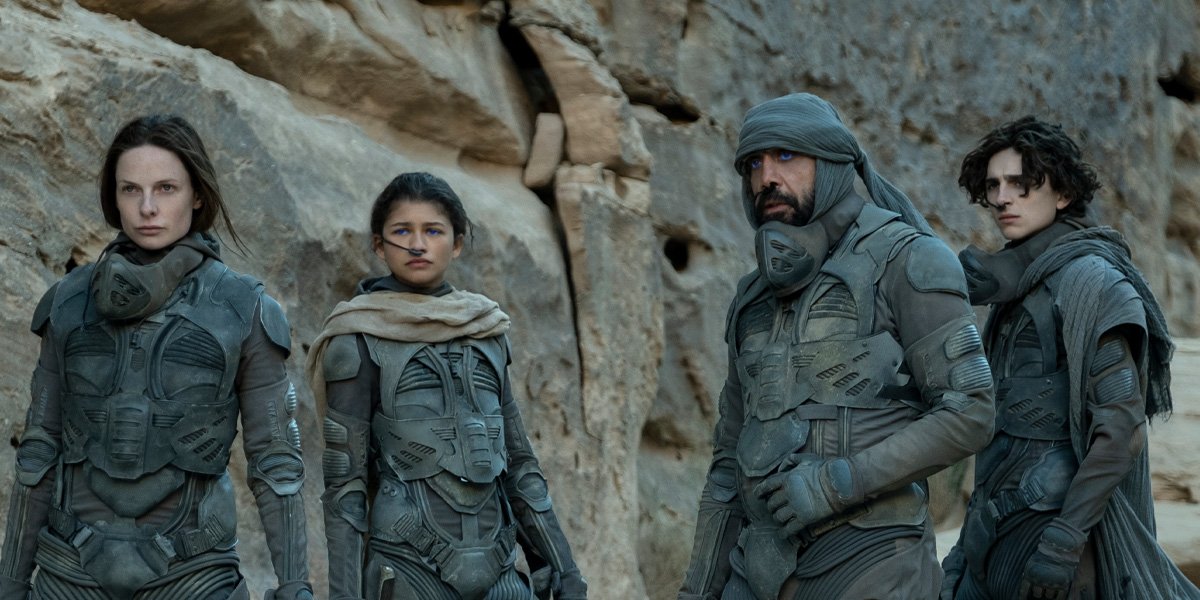
The audio design and music suite throughout Dune begs for the experience to be seen in theatres just as much as the visuals do. IMAX theatres are ideal as well, where the many subtle sound cues and exotic instrumentation feel most immersive and exciting. There’s a ton of painstaking audio work achieved throughout Dune, and the movie’s ability to capture a massive, imposing sense of exotic scope is legitimately mind-blowing. Audiophiles are in for a real treat here, with Dune presenting one of the best cinematic soundscapes that 2021 has to offer, especially if you have the privilege of experiencing it in an IMAX theatre!
Dune, true to form for writer-director, Denis Villeneuve, is a visual masterpiece. The world of Arakkis is brought to stunning life throughout every corner of this production, feeling both recognizable and alien in equal measure. The use of colour and tint contrast throughout the cinematography especially succeeds as a sharp, engaging story device for what’s otherwise very heady, slow-paced material. Ordinary scenes are often framed around a blend of soft, muted browns, golds and blacks, while scenes based around dreams and psychic intuition are suddenly bright, feverish and almost deliberately garish, instead presenting reds, blues and other harsh colours that excellently add to the feeling of mental distress.
What’s most impressive about Dune’s visual suite however is how huge it all feels! Even as we barely scratch the surface of this movie’s far-future setting and its various political and psychological workings, Arakkis and its sister worlds instantly feel like places rich in thousands of years of history and lore. Arakkis’ untamed desert environments are undeniably hazardous from a glance to boot, yet also bursting with a sense of cautious intrigue. This is best exemplified during the handful of moments that show off Arakkis’ largest and most impressive creatures, the gargantuan Sand Worms, titans of armour and teeth that swallow anyone who disobeys the sacred laws of the endless desert. Even that incredible ferocity can give way to deceptive beauty however, as House Atreides braves the sandy wastes of Arakkis to extract valuable Spice, a sparkling, mind-altering treasure that’s allegedly crucial as a foundation for Dune’s spacefaring future society.
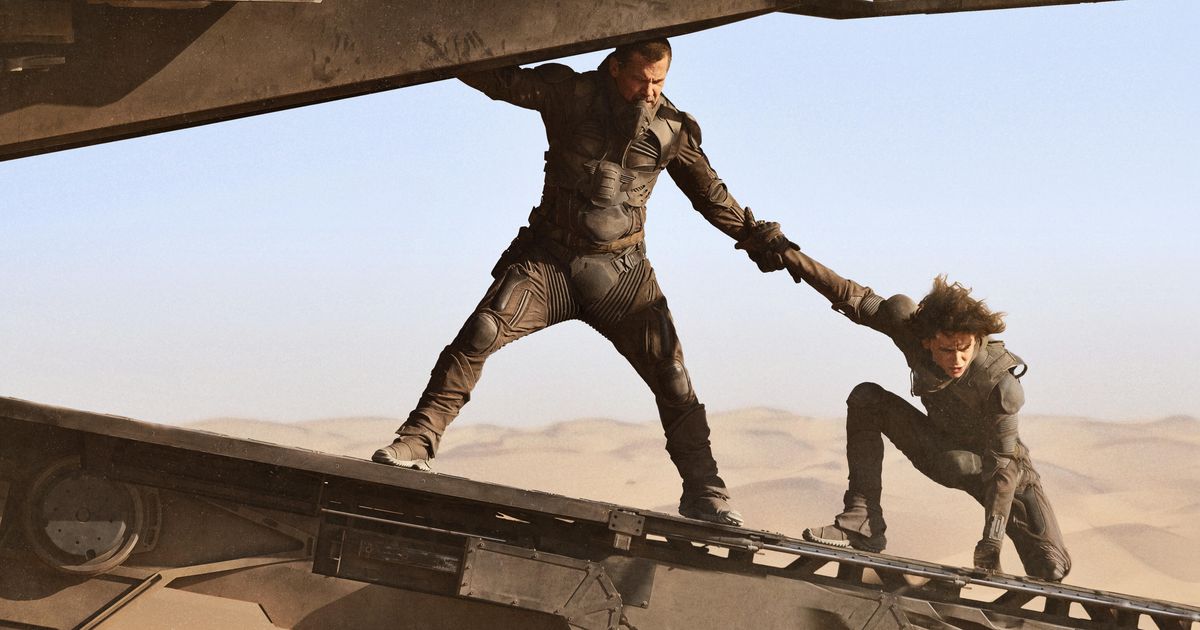
Unsurprisingly, Dune also contains several scenes filmed with IMAX cameras, further lending to the movie’s awe-inspiring presentation. While Dune may or may not be available for home viewing at this point, depending on your region, its visuals are definitely at their best on an IMAX screen, so you should ideally experience it in that format. At the very least, Dune demands to be viewed in a movie theatre, where its grand visuals feel appropriately large and engrossing. Regardless of format however, Dune’s visuals are excellent all around, setting a new benchmark for Denis Villeneuve’s already-impressive array of effects-heavy blockbusters.
Dune is a reality-bending trip of epic proportions. It’s a beautiful, rich and engrossing adventure within a futuristic world that feels both inconceivable and undeniably human. That’s why it sucks that this new movie adaptation of Frank Herbert’s beloved sci-fi novel is deliberately incomplete, forcing us to wait years before we see the proper conclusion to the many character arcs and political twists that Dune brings to the table in its first outing.
In a strange way though, one of Dune’s only notable weaknesses as an adaptation still manages to be something of an ironic strength. The fact that Dune’s premature conclusion is so infuriating stands as a testament to how incredible it feels to get a glimpse into this world, and how much audiences will crave more once the movie is done. Dune’s stunning technical achievements and nuanced, tangled storytelling stand as some of the best blockbuster work in all of 2021. It’s quite simply must-see sci-fi, regardless of whether or not you’ve seen the previous 1984 movie, or have any familiarity with Frank Herbert’s original prose.
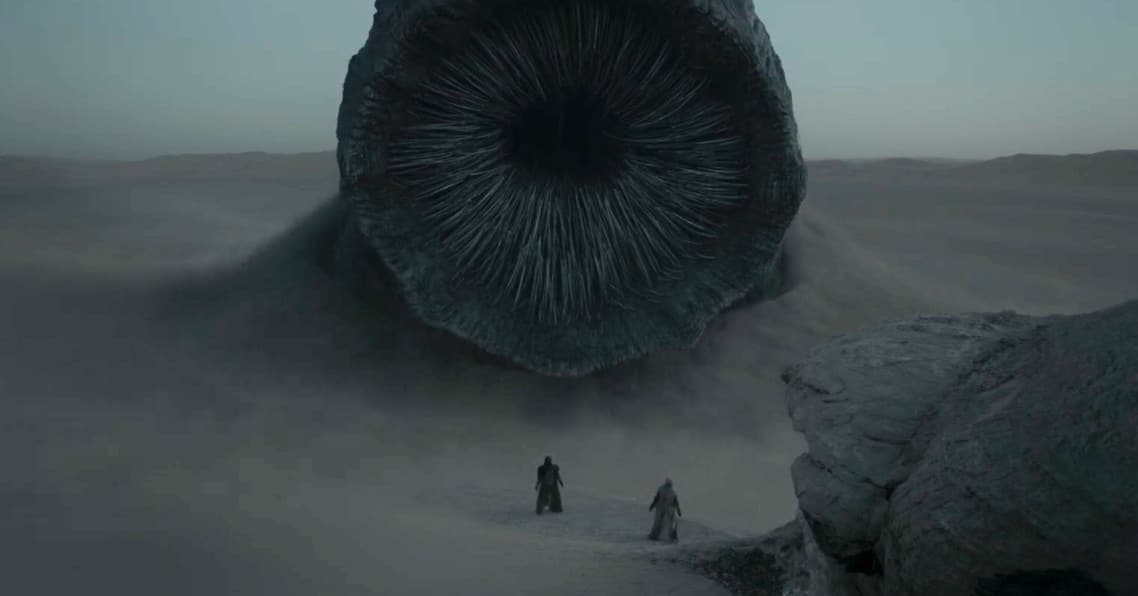
When we’re eventually blessed with its in-development follow-ups, Dune has the potential to become cinema’s next Lord of the Rings-level epic. Like that timeless journey through Middle-earth, we’re intentionally denied the full scope of the story in this first adaptation, but it’s nonetheless easy to carry hope for this franchise’s future when it’s based within a world that’s clearly filled with endless possibilities. Finally, Frank Herbert’s sprawling opus gets the adaptation it deserves, and even then, we’ve only scratched the surface of the imaginative frontiers that Dune can bring us to next.

